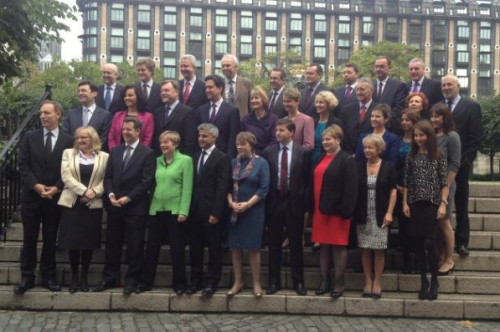
Ed Miliband will not win the General Election – but Labour still can. If Milibands find themselves measuring the curtains next May, it will be because people voted for parties and policies, not leaders.
CCHQ’s strategy for the next twelve months writes itself: use every opportunity to make the campaign about individuals and personalities. Dave vs Ed. Who can the voters imagine standing outside Number 10, or fighting for Britain’s interests, or answering the 3am phone call?
The answer, for the most part, seems to be Cameron. Despite four years of leading an often unpopular Coalition, the PM’s personally approval ratings have stubbornly performed better than the party he leads. In contrast, a Guardian ICM poll pegged Ed Miliband’s net approval rating at minus 25, with 51% of voters believing he is doing a bad job as leader of the opposition. More than one in four people are dissatisfied with David Cameron, but given the choice would still prefer him as Prime Minister over Ed Miliband.
And the debate about leadership links directly to the discussion about the economy. Cameron will claim to have taken the tough choices that Labour would not, securing Britain’s future prosperity.
So if the Conservatives are keen to paint 2015 as a presidential tête-à-tête, you might assume that it was in Labour’s interests to do the exact opposite. Instead, we have just witnessed an election campaign described by one Shadow Cabinet member as ‘all about Ed’. Of course, Labour had some successes, especially in London’s bellwether swing seats. But these victories crucially failed to make inroads with middle-England’s working class and aspirational middle classes outside London, two groups Tony Blair successfully reached out to when securing a broad majority.
As predictable as a rain-soaked Bank Holiday Monday, a steady drizzle of malcontent in the Party soon gave way to a steady downpour of unnamed sources questioning if Miliband is the right man to lead Labour to a majority that, until a few months ago, they looked firmly on course for.
As always, such interventions are an unnecessary distraction. A leadership contest at this point in the campaign would be suicidal for Labour’s electoral chances. It would also reek of ‘grass is greener’ syndrome. It is easy to forget how hard it is to bounce back from general election defeats: Miliband deserves credit for leading a mostly-unified and disciplined party away from a history of circular firing squads and towards a policy agenda that, like it or not, offers bold solutions to the problems faced by families across Britain.
When it comes to policies, Labour is winning the race. In a ComRes survey, 32 per cent said Labour’s proposals for government, such as freezing energy prices, made them more inclined to support the party – twice as many as those for whom policies were a turn-off.
Tom Mludzinski, head of political polling at ComRes, put it thus: “Although the party’s policies gain some traction, the public remain unconvinced by his leadership.”
Put another way: if Labour wins in 2015, it will be despite Ed Miliband, not because of him.
But how to take these lessons and apply them to a communications campaign that can secure victory? At the risk of offering Ed Miliband yet more unsolicited advice, the answer seems obvious. Run a campaign that’s ‘Not about Ed’.
Labour should channel the benefits of Britain’s Parliamentary democratic system and assemble a ‘Dream Team’ of Shadow Cabinet members to surround Miliband at every opportunity. It is down to Axelrod and his team of spinners to remind voters that they are choosing a party, not a single leader. Posters, campaign literature, policy announcements; none of these should rely on the image of Miliband alone. Drop the niche film noir references and craft party political broadcasts with a cast of characters from across the party. Ed Miliband must be hidden in a chorus of voices.
In terms of the exact line up for this elite team of media big hitters my suggestions would include Yvette Cooper, Chuka Umunna, Tristram Hunt, Andy Burnham and Rachel Reeves. This is no place for egos. Yes, Ed Balls is in effect number two as Shadow Chancellor, but this is also a purely vote-winning exercise amongst non-Labour supporters and Balls is hardly blue-chip stock.
Such a strategy would also repeatedly draw attention to a key Tory weakness – the lack of diversity in the Cabinet.
But would it win back votes? There are two key constituencies that could yet secure a Labour majority, Lib Dem voters and ‘undecideds’. Handily, a Survation/Mail on Sunday poll asked these groups what they thoughts of Labour’s leadership candidates. Over two-thirds of Lib Dems felt Yvette Cooper was a better prospect for Labour leader than Ed Miliband, while 36 per cent would consider voting for the shadow Home Secretary. Almost half of undecided voters felt Umunna was an improvement on Miliband. When asked the most important characteristic in a political leader, the top answer was ‘in touch with ordinary people’ – a characteristic the majority of respondents felt Andy Burnham has.
Clement Atlee, hardly the superstar politician, succeeded as Labour leader by surrounding himself with talented voices. Labour is well on the way to crafting a strong offer to the electorate, they just need a better sales team.
Rob Macpherson is a Communications Officer at the think-tank Demos. He writes in a personal capacity and tweets @RJ_Macpherson




More from LabourList
‘Unity or division’: Starmer’s message to voters in Gorton and Denton
Almost half of Labour members oppose plans to restrict jury trials, poll finds
‘How Labour can finally fix Britain’s 5G problem’